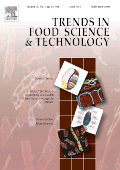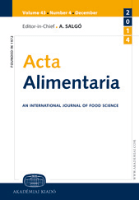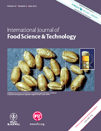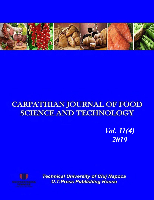
FOOD TECHNOLOGY
Scope & Guideline
Connecting Experts with Cutting-Edge Research
Introduction
Aims and Scopes
- Food Innovation and Technology:
Explores advancements in food processing technologies, product development, and innovations that enhance food safety and quality. - Nutrition and Health:
Investigates the relationship between food choices, dietary patterns, and health outcomes, emphasizing functional foods and their role in wellness. - Sustainability and Environmental Impact:
Addresses sustainable practices in food production, packaging, and waste management, highlighting the importance of reducing the food industry's environmental footprint. - Consumer Trends and Market Insights:
Analyzes consumer behavior, preferences, and trends that shape the food market, including the rise of plant-based diets and health-oriented products. - Food Safety and Regulation:
Focuses on issues related to food safety, including pathogen control, regulatory standards, and innovations in food traceability. - Culinary Science and Sensory Analysis:
Examines the scientific principles behind food preparation and the sensory attributes of food products, enhancing understanding of consumer preferences.
Trending and Emerging
- Plant-Based Alternatives:
The rise of plant-based diets and products continues to gain momentum, with increased focus on innovations in plant-based proteins and consumer acceptance. - Food as Medicine:
Research exploring the role of food in health and wellness is on the rise, emphasizing the therapeutic benefits of functional foods and dietary interventions. - Sustainable Practices:
Sustainability is a growing theme, with increasing emphasis on eco-friendly packaging, waste reduction strategies, and sustainable sourcing practices. - Digital Transformation in Food Technology:
The integration of digital tools, AI, and automation in food production is emerging as a significant area of interest, reflecting the industry's shift towards smart technologies. - Food Security and Resilience:
Themes related to food security, resilience in food systems, and strategies to combat food insecurity are becoming more prevalent, particularly in light of global challenges.
Declining or Waning
- Traditional Food Preservation Methods:
There has been a noticeable decline in focus on conventional food preservation techniques, as modern technologies and innovations in food safety take precedence. - Overly Processed Foods:
Discussions surrounding overly processed foods are waning as consumer interest shifts towards clean label products and transparency in food production. - Single-Ingredient Focus:
The trend of highlighting single-ingredient foods is decreasing in favor of discussions on complex formulations and multi-ingredient innovations that enhance health benefits. - Regional Cuisine Exploration:
Exploration of traditional regional cuisines appears less frequently, as the journal increasingly emphasizes global food trends and health-oriented innovations. - Long Shelf-Life Products:
Interest in products designed solely for long shelf-life is diminishing, replaced by a focus on freshness, local sourcing, and short supply chains.
Similar Journals

TRENDS IN FOOD SCIENCE & TECHNOLOGY
Transforming knowledge into culinary breakthroughs.Trends in Food Science & Technology, published by Elsevier Science London, stands as a premier journal in the fields of food science and biotechnology. With an impressive Q1 ranking in both the food science and biotechnology categories, it is recognized for its rigorous peer-reviewed articles that advance knowledge and innovation in the sector. The journal’s Scopus rankings validate its significance, placing it in the top percentile among its peers, with a remarkable rank of #2 out of 389 in Agricultural and Biological Sciences - Food Science, and #4 out of 311 in Biochemistry, Genetics, and Molecular Biology - Biotechnology. Since its inception in 1990, the journal has become a vital resource for researchers, professionals, and students alike, offering insights into contemporary challenges and trends impacting food technology. Although it operates under a subscription model, the quality of research published within its pages makes it an essential read for anyone involved in advancing the science of food.

ITALIAN JOURNAL OF FOOD SCIENCE
Pioneering Insights in the Culinary WorldITALIAN JOURNAL OF FOOD SCIENCE is a distinguished open-access publication dedicated to advancing knowledge in the field of food science, catering to a global audience of researchers, professionals, and students. Published by Codon Publications in Singapore, this journal, operating under the ISSN 1120-1770 and E-ISSN 2239-5687, has been a vital platform for scholarly discourse since its inception in 1996, converging towards a comprehensive view of food science trends through 2024. With an impressive ranking in the third quartile (Q3) of the Food Science category and a Scopus rank of #151 out of 389, the journal plays a significant role in disseminating high-quality research, contributing to a richer understanding of food science within the agricultural and biological sciences. Since transitioning to open access in 2008, it has further expanded its reach, ensuring that innovative research is accessible to all, thereby fostering collaboration and knowledge exchange in this vital industry.

International Journal of Gastronomy and Food Science
Pioneering Research in Culinary Arts and Food SystemsThe International Journal of Gastronomy and Food Science, published by ELSEVIER, serves as a premier platform for scholars and practitioners in the domains of gastronomy and food science. With an ISSN of 1878-450X and E-ISSN 1878-4518, this journal has been recognized for its impact, holding a prestigious Q1 ranking in Cultural Studies and a Q2 ranking in Food Science as of 2023, thereby reflecting its influence and relevance in the field. It is particularly noted for its robust Scopus rankings, placing 28th out of 1304 in Social Sciences - Cultural Studies, advocating for high-quality research with a 97th percentile ranking, and 117th in Agricultural and Biological Sciences – Food Science with a 70th percentile ranking. This open-access journal offers a comprehensive exploration of food-related issues, aiming to bridge the gap between culinary arts and scientific research, enhancing the understanding of food systems and cultural significance. For researchers, professionals, and students alike, the International Journal of Gastronomy and Food Science is an invaluable resource, dedicated to fostering innovation and comprehensive discourse in culinary studies.

ACTA ALIMENTARIA
Connecting research and practice in food technology.ACTA ALIMENTARIA is a renowned journal in the field of food science, published by AKADEMIAI KIADO ZRT, based in Hungary. Since its inception in 1973, it has served as a vital platform for disseminating high-quality research on food chemistry, microbiology, nutrition, and technology, contributing significantly to the advancement of knowledge in the agricultural and biological sciences. Currently classified in the Q3 quartile of the 2023 Food Science category, the journal is positioned to address pressing issues pertaining to food safety, quality, and sustainability, making it an invaluable resource for researchers, professionals, and students alike. Although it does not currently offer open access, the journal maintains a strong reputation with a readership keenly interested in the latest developments in food science. With a Scopus rank placing it in the 38th percentile of its category, ACTA ALIMENTARIA continues to be a pivotal reference for those engaged in food research and innovation.

INTERNATIONAL JOURNAL OF FOOD SCIENCE AND TECHNOLOGY
Connecting Researchers to the Heart of Food ScienceINTERNATIONAL JOURNAL OF FOOD SCIENCE AND TECHNOLOGY, published by WILEY, serves as a premier platform for the dissemination of cutting-edge research in the field of food science and technology. With an ISSN of 0950-5423 and E-ISSN 1365-2621, this journal has been committed to publishing high-quality research since 1966 and is set to continue its impactful contributions through 2024. Recognized for its excellence, it holds a Q1 ranking in Food Science and a Q2 ranking in Industrial and Manufacturing Engineering as of 2023. The journal ranks #95/384 in Industrial and Manufacturing Engineering and #100/389 in Food Science on Scopus, placing it within the top quartiles of these fields. Although it does not currently offer Open Access, researchers and professionals benefit from access to a wealth of knowledge that advances understanding in both applied and theoretical aspects of food science. This journal is indispensable for anyone in the academic and professional domains who seeks to stay abreast of innovations and trends shaping the food industry.

FOOD TECHNOLOGY AND BIOTECHNOLOGY
Exploring New Frontiers in Food Technology and BiotechnologyFOOD TECHNOLOGY AND BIOTECHNOLOGY is a distinguished peer-reviewed journal published by the Faculty of Food Technology and Biotechnology, University of Zagreb, Croatia. Since its inception in 1993, this Open Access journal has become a crucial platform for disseminating innovative research in the fields of food science, biotechnology, and chemical engineering. With a commendable impact factor and consistent Q2 and Q3 rankings across multiple categories—including Biotechnology, Food Science, and Industrial Engineering—this journal not only fosters academic discussions but also addresses real-world challenges in food production, safety, and sustainability. As it converges its thematic scope from 1996 to 2024, FOOD TECHNOLOGY AND BIOTECHNOLOGY remains committed to advancing knowledge through high-quality research and interdisciplinary collaboration, making it an essential resource for researchers, professionals, and students seeking to stay at the forefront of food innovation and biotechnology.

FOOD SCIENCE AND BIOTECHNOLOGY
Pioneering Discoveries in Food Science and MicrobiologyFOOD SCIENCE AND BIOTECHNOLOGY, published by the Korean Society of Food Science & Technology (KOSFOST), stands as a prominent peer-reviewed journal dedicated to advancing knowledge in the fields of food science, biotechnology, and applied microbiology. With ISSN 1226-7708 and E-ISSN 2092-6456, this journal serves as a pivotal platform for disseminating high-impact research from South Korea and beyond, reflecting a robust Q2 ranking in multiple categories including Applied Microbiology and Biotechnology, Biotechnology, and Food Science as of 2023. The journal's influence is further emphasized by its positions in various Scopus ranks, where it showcases a commendable percentile ranking in Agricultural and Biological Sciences and Biochemistry. Although access options remain limited, the journal’s objectives revolve around the publication of innovative research, fostering interdisciplinary collaboration, and facilitating the exchange of ideas among a diverse community of researchers, professionals, and students. Whether you are involved in food technology, microbial biotechnology, or nutritional sciences, FOOD SCIENCE AND BIOTECHNOLOGY are instrumental in shaping the future of these critical fields, propelling advancements that enrich our understanding of food systems and health.

Foods
Empowering Ideas in Food Science and Microbiology.Foods is a premier open access journal published by MDPI, based in Switzerland, that has been at the forefront of disseminating high-quality research in the fields of food science, health professions, and plant science since its establishment in 2012. With an impressive convergence of interdisciplinary studies spanning various aspects of food, nutrition, and microbiology, the journal aims to provide a comprehensive platform for researchers and professionals to share innovative ideas and findings. Maintained as a Q1 journal in multiple categories for 2023, including Food Science and Health Professions, Foods has garnered significant recognition within the academic community, reflected in its strong Scopus rankings and percentiles across various disciplines. The journal not only promotes open access to enhance the visibility and accessibility of research but also encourages the exploration of sustainable food systems and health-related issues, thus contributing to essential discussions in today's society. For those looking to advance their understanding and expertise in food-related sciences, Foods serves as an enduring resource for groundbreaking studies and critical insights.

Food Production Processing and Nutrition
Transforming food systems for public health excellence.Food Production Processing and Nutrition, published by SpringerNature, stands at the forefront of advancing knowledge in the vibrant fields of food science, nutrition, and public health. This esteemed Open Access journal, operational since 2019, plays a pivotal role in disseminating breakthrough research that intersects food production processes with nutritional insights, making it an invaluable resource for researchers, professionals, and students alike. With a commendable 2023 impact factor reflecting its robust scholarly contributions — Q1 in Food Science and Q2 in both Nutrition and Dietetics and Public Health, Environmental and Occupational Health — the journal not only emphasizes the importance of innovative food processing methods but also addresses pressing nutritional challenges faced globally. Located in the United Kingdom, it claims an impressive Scopus ranking, with a notable percentile standing across various categorical metrics. As such, Food Production Processing and Nutrition is essential for anyone aiming to deepen their understanding of how food systems impact public health through effective processing and nutritional strategies.

Carpathian Journal of Food Science and Technology
Transforming Ideas into Innovations in Food ScienceCarpathian Journal of Food Science and Technology, a distinguished publication from the NORTH UNIV CENTER BAIA MARE, has been a pivotal platform for disseminating groundbreaking research in the field of food science since its inception in 2009. With an ISSN of 2066-6845 and an E-ISSN of 2344-5459, this Open Access journal aims to promote knowledge and innovation, offering unrestricted access to its content, thereby enhancing visibility for authors and facilitating a wider readership. Based in Romania, the journal plays a crucial role in advancing scientific inquiry within the agricultural and biological sciences, particularly focusing on contemporary food science issues. As it continues its convergence through 2024, the journal currently holds a Q4 ranking in the Food Science category, allowing it to carve out a unique niche within the academic community despite its current Scopus percentile ranking of 19th. Scholars, researchers, and students in the field will find the journal an invaluable resource for the latest advancements and discussions, making it an essential addition to their academic pursuits.